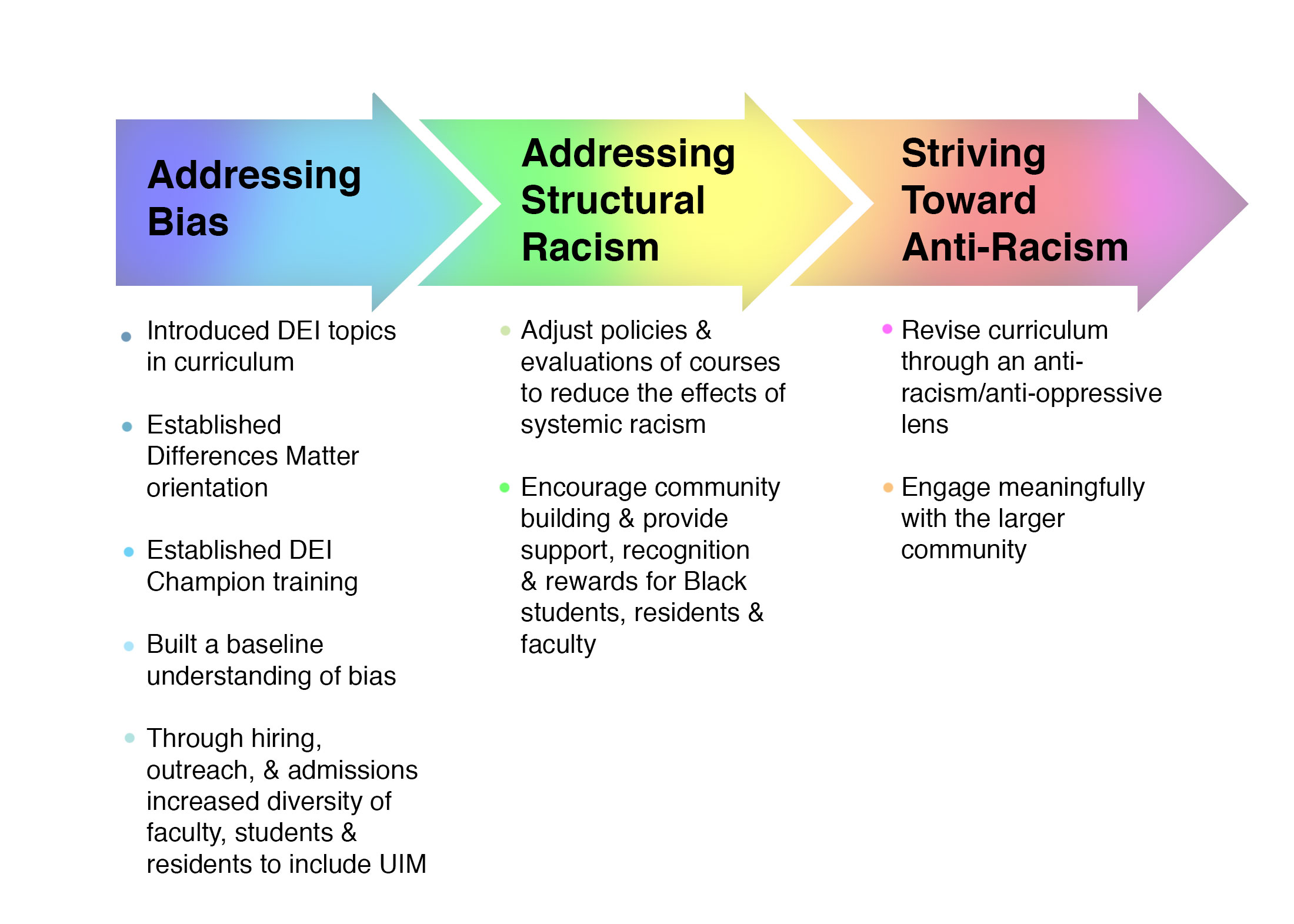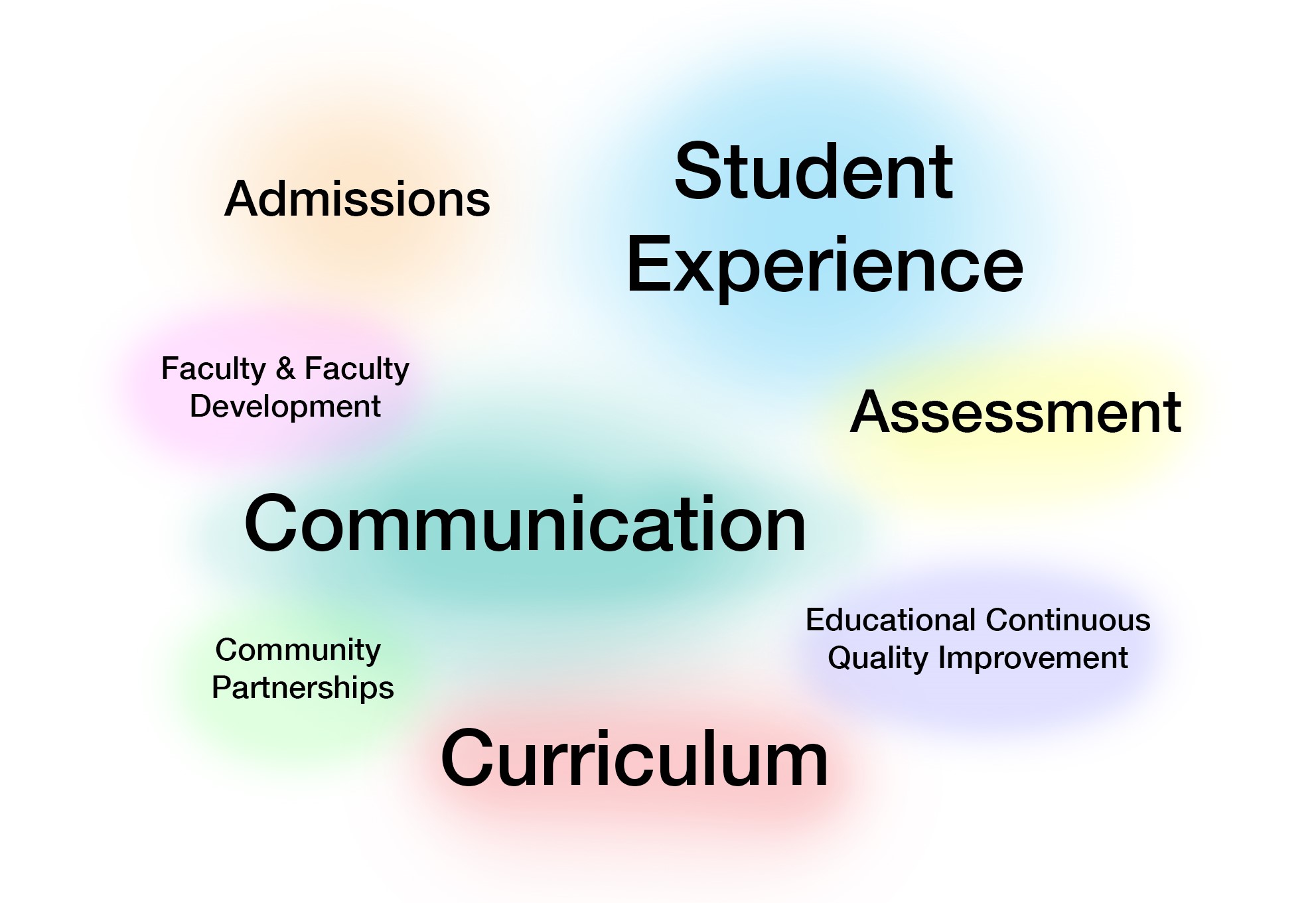Diversity, Equity, Belonging, and Anti-Oppression
Focusing on Anti-Oppression to Build an Equitable Medical School
Why Anti-Oppression?
We strive to create equitable environments that cultivate a sense of belonging, because they are essential to high-quality patient care, effective learning, and cutting-edge discovery.
We seek to educate UCSF medical students to become physicians and leaders committed to advancing health for all – prepared and able to dismantle the structural racism/oppression in medicine and health care. These practitioners must be prepared to do the following:
- Provide safe, equitable, high-quality, and respectful care to an increasingly diverse population of people, in a manner aligned with the goals of those individuals and their families,
- Apply existing and discover new knowledge to solve the complex problems that cause suffering and rob people of their opportunity to live long and productive lives,
- Lead and support interprofessional teams, comprised of diverse individuals with multiple points of view, and
- Partner with colleagues, patients, and communities to identify and dismantle the structural racism and oppression that exists within medicine and health care.
UCSF DEI and Anti-Oppression Initiatives

Initiative Goals
UCSF Campus
Vice Chancellor of Diversity and Outreach, Renee Navarro
GOALS:
- Create a Healthy, Safe, and Welcoming Climate for Employees and Leaners at UCSF
- Address Anti-Racism Knowledge Gaps
- Embed Equity as a Part of Essential Criteria in Decision-Making
- Achieve Demographic Diversity in Leadership
- Achieve Equity in Patient Care, Including Affiliates
- Further UCSF Commitment to the Bay Areas
- Make Structural Changes Required to Address Equity and Anti-Racism for Research Endeavors at UCSF
School of Medicine
Dean, Talmadge King
GOALS:
- Diversify the Academy of Medicine
- Generate, Disseminate, and Apply New Knowledge
- Build Anti-Racism/Anti-Oppression Expertise within UCSF
- Optimize the Culture of Equity and Inclusion at UCSF
Medical Education
Associate Dean for Curriculum, John A. Davis
GOALS:
- Optimize Support for Diverse Students
- Prepare Faculty for Roles in Anti-Oppression Medical Education
- Optimize Instruction to Dismantle Structural Racism/Oppression in Medicine and Medical Education
- Prevent Curricular Harm and Rectify When it Does Occur
- Build Community Relationships to Prepare Physicians to Engage in Anti-Racism/Anti-Oppression Work
- Openly Communicate Progress Made Towards Anti-Oppression Goals
Anti-Oppression Curriculum Initiative
Director, Denise Connor
GOALS:
- Review and Adapt the Bridges Curriculum to Build a Responsive, Anti-Oppression Medical School Curriculum
Track Our Progress
Building an equitable medical school requires an ongoing, continuous effort across the campus, health system, and School of Medicine. We are committed to progress, and we invite you to follow our development. For specific questions related to progress on the School's Anti-Oppression Initiatives, please contact Tamara Lawson, Project Manager, Anti-Oppression Initiatives.
Where We Have Been
Recognizing that our goal of building an equitable medical school is by necessity a long-term, iterative process, we remain proud of UCSF’s progress over the years and the School’s track record of partnering with forward-thinking student activists and leadership to achieve anti-racism goals. The UCSF School of Medicine has contributed to this important national conversation through scholarly research and programmatic and curricular changes.
This timeline, beginning in 2014, catalogues the milestones of our anti-oppression work to make the UCSF School of Medicine a more diverse and equitable medical school.
To adjust your view of this timeline, search by keyword, or sort by type of milestone or mission area, please click the wrench icon in the lower righthand corner of your screen.
Striving to Become an Equitable Medical School
Our initial work focused on increasing the diversity of our students, residents, and faculty and addressing interpersonal biases that contribute to inequities in health care for patients, education for students, and incorporating diversity issues into the curriculum.
We recognize the need to accelerate our efforts by focusing on anti-oppression.
We are actively focusing on addressing structural racism and advancing our anti-racism/anti-oppression efforts throughout all elements of medicine and medical education.


Overarching Goals
1. Student Support: Optimize Support for Students Across Diverse and Historically Disadvantaged Backgrounds
We seek to create a welcoming, respectful environment where everyone feels they belong. In addition to the resources available to all UCSF students, UCSF School of Medicine provides opportunities for student support spanning academic and career counseling and emotional and mental health support.
- Learn more about all available School of Medicine Student Services and UCSF’s Student Success Center.
2. Faculty and Faculty Development: Prepare Faculty for Roles in Anti-Racism Medical Education
The School of Medicine will prepare faculty for their roles in anti-racism medical education. Existing faculty development will be redesigned to ensure faculty are prepared to discuss and teach anti-racism concepts.
- As of March 2022, over sixty percent of UCSF School of Medicine faculty members and more than 1000 staff members have completed our six-hour Diversity, Equity, and Inclusion (DEI) Champion Training.
- Anti-Racism and Race Literacy: A Primer and Toolkit for Medical Educators
- Teaching for Equity and Inclusion Certificate, Teach for UCSF Certificate Program
3. Curriculum: Optimize Instruction to Dismantle Structural Racism/Oppression in Medicine and Medical Education
Anti-Oppression Curriculum Initiative
Our Anti-Oppression Curriculum (AOC) Initiative aims to develop an anti-oppressive curriculum that will prepare all UCSF medical students to assume their role in partnering with patients and communities to combat oppression and advance health equity.
- Learn more about the AOC Initiative
- Learn more about AOC Initiative Resources and Tools
4. Educational Continual Quality Improvement: Prevent Curricular Harm and Rectify When it Does Occur
The School of Medicine transitioned to pass-fail grading in 2019 with the goal of minimizing the impact of bias in assessment at UCSF. Today, we continue to develop just-in-time adjustments to our curriculum to ensure that our curriculum is constantly evolving to be more anti-oppressive.
- Engaged with external community consultants to revise Health & Society Blocks in Spring 2022.
- External anti-racism experts were engaged to redesign Differences Matter Orientation and Health & Individual block in fall 2022.
- Developing a new process for assessing and evaluating our courses and ensuring ‘real-time’ feedback is captured and immediately reported.
- Learn more about SAFE reporting
- Learn more about Assessment FOR Learning
- Learn more about Equity in Assessment
5. Community Partnerships: Build Community Relationships to Prepare Physicians to Engage in Anti-Racism/Anti-Oppression Work
We seek to further the School of Medicine’s commitment to the Bay Area by seeking community input into anti-oppression content, identifying patients who have experienced oppression to serve as paid instructors for relevant course experiences, and incorporating opportunities for student service and learning alongside community organizations.
6. Communications: Openly Communicate Progress Made Towards Anti-Oppression Goals
To ensure transparency and accountability on our journey towards our goals, we will communicate about progress via regular updates to this webpage. For specific questions related to progress on the School's Anti-Oppression Initiatives, please contact Tamara Lawson, Project Manager, Anti-Oppression Initiatives.
Contact Us
